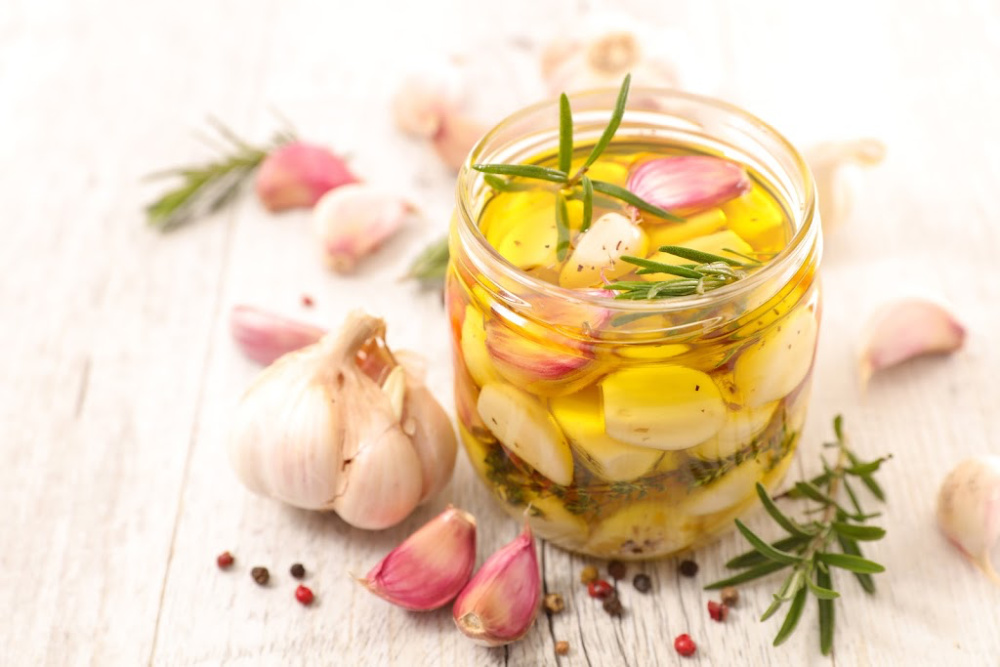
Davis Western Institute for Food Safety and Security. No recom-mendations are listed for refrigeration.
Its important to keep food safety in mind when storing vegetables such as garlic mushrooms chili peppers or herbs in oil.
Garlic in oil food safety. The concern with storing garlic in oil is that garlic is a low-acid vegetable which makes it ideal for culturing Clostridium botulinum the bacteria that causes botulism. As long as the bacterium is exposed to oxygen it cannot develop the spores which secrete the toxin so garlic itself is perfectly safe. Storing Garlic in Oil Take extreme care when preparing flavored oils with fresh garlic or when storing fresh garlic in oil.
Peeled garlic cloves may be submerged in oil and stored in the freezer for several months or in the refrigerator for no more than 4 days. Label refrigerated garlic in oil. The Food and Drug Administration says extreme caution must be taken when it comes to storing garlic in oil because of the threat of Clostridium botulinum or botulism.
Place peeled garlic cloves in a food processor and process them to a rice grain size or slightly smaller consistency. Using a teaspoon place 1-2 teaspoons of the chopped garlic in each compartment. 1 teaspoon equals 1 medium to large size chopped garlic clove.
Push the garlic onto the bottom of each compartment as much as. Safety of Infused Oils Herbs garlic and other vegetables used to flavor oils are low acid foods and can be a source of Clostridium botulinum spores. When these spores are surrounded by oil an oxygen free environment is created that encourages the growth of the spores at room temperature.
A ratio of 1 part garlic to 10 parts oil by weight is recommended but the ratio can be varied from this to achieve appropriate flavor. While the procedure recommends removing the garlic once appropriate flavor has been achieved generally in 1 to 10 days there is no food safety risk if the garlic is kept in the oil for longer. You can do a garlic in oil but you CANNOT leave it at room temperature and you CANNOT keep it safely for more than one week in the fridge.
After that point even kept in the fridge the toxins can be building up into dangerous levels. Because its a toxin its not something we can. In the Food and Drug Administration requiring companies to stop making garlic-in-oil mixes that were protected only by refrigeration.
For safety the products were required to contain specific levels of microbial inhibitors or acidifying agents 7. However cases continued to be reported. In 2003 a thirty-.
17 that stated that storing garlic in oil at room temperature was unsafe and that suggests storage in the freezer. No recom-mendations are listed for refrigeration. Although commercially prepared garlic is acidified the publication did not recom-mend this method to consumers citing its complexity.
While storing garlic in olive oil is a great way to preserve it and offers the added bonus of lots of garlic-infused olive oil for cooking you can store garlic for up to four months when you preserve it in vinegar. Simply place your peeled cloves in a heat-safe container. Garlic in oil vs.
Food safety Melanie Wong Oct 4 2009 0128 PM 3 Editors the new tip for making garlic and herb oil runs counter to safe food practices. If garlic cant be safely stored in oil for more than 24 hours due to risk of botulism what about vinaigrette made with garlic. Linda Harris associate director of the UC.
Davis Western Institute for Food Safety and Security. Chop the garlic wrap it tightly in a plastic freezer bag or in plastic wrap and freeze. To use grate or break off the amount needed.
Freeze the garlic unpeeled and remove cloves as needed. Peel the cloves and puree them with oil in a blender or food processor using 2 parts oil to 1 part garlic. Food Safety Note and Disclaimer.
Garlic is a low-acid ingredient and if stored improperly in oil without oxygen and in warm temperatures at room temperature it can produce a very serious toxin that causes botulism. Homemade garlic confit and garlic oil should always be made and immediately stored in the refrigerator for food safety reasons. PART 184 – DIRECT FOOD SUBSTANCES AFFIRMED AS GENERALLY RECOGNIZED AS SAFE Subpart B - Listing of Specific Substances Affirmed as GRAS Sec.
1841317 Garlic and its. Its important to keep food safety in mind when storing vegetables such as garlic mushrooms chili peppers or herbs in oil. These low-acid foods can be a source of Clostridium botulinum bacteria which are found in soil water and air.
Oils oxygen-free environment is perfect for growth of the bacteria. For this reason herbs and vegetables in oil must be stored correctly to prevent botulism food poisoning. Garlic stored in olive oil at room temperature is a way of getting botulism.
Organic can sometimes be more of a problem because manure is sometimes used as fertilizer. Make sure to refrigerate the product and it is a good idea to wash the garlic if it is organic especially if you are not cooking it. Following a second botulism outbreak from garlic-in-oil in 1989 the FDA ordered the removal from store shelves of commercial garlic-in-oil preparations that lacked an acidifying agent phosphoric or citric acid and required that all future preparations contain the acid.
Using dried garlic andor herbs is the safest way to make infused oils without acidifying the product. Fresh herbs introduce water into the oil and dangerous bacteria need water to grow. Dried herbs and garlic add no water to the oil so bacteria cant grow.
Select a good-quality olive or other vegetable oil.